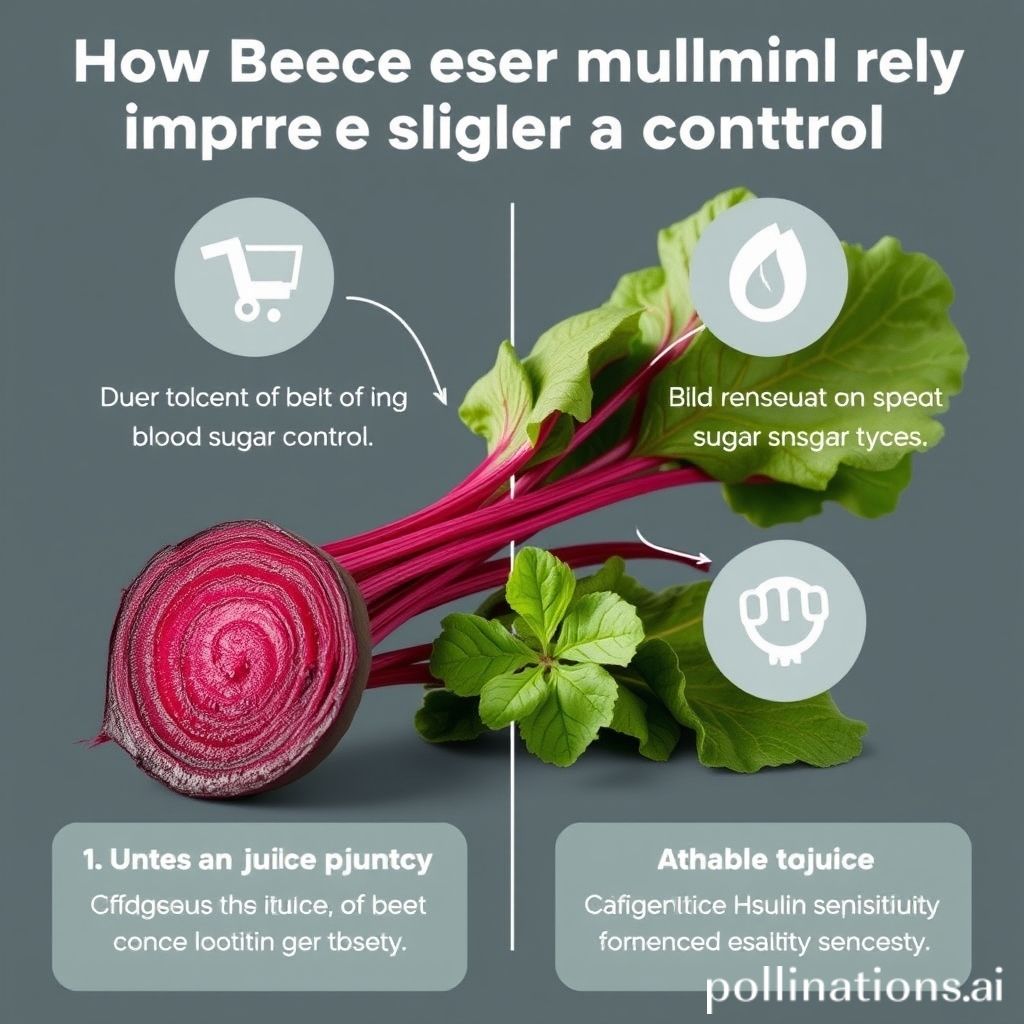Is Drinking Beet Juice Good For Diabetics?
For individuals with diabetes, the question of whether drinking beet juice is good for their health often arises. Many are curious to know if adding this vibrant and earthy beverage to their diet can have any positive effects on their blood sugar levels.
Fortunately, research suggests that beet juice may indeed offer some benefits for diabetics. Packed with essential nutrients like fiber, nitrates, folate, potassium, magnesium, and vitamin C, beet juice holds the potential to aid in managing and improving blood sugar control. By Examining the potential advantages of incorporating beet juice into their daily routine, individuals with diabetes can make informed decisions about their dietary choices and overall well-being.

Table of Contents
Understanding Diabetes and Blood Sugar Levels
1. What is diabetes and how does it affect blood sugar levels?
Diabetes is a chronic condition characterized by high levels of glucose in the blood. There are two main types of diabetes: type 1 and type 2. Type 1 diabetes occurs when the body does not produce enough insulin, a hormone responsible for regulating blood sugar levels. Type 2 diabetes, Though, occurs when the body’s cells do not respond effectively to insulin, leading to insulin resistance.
When individuals with diabetes consume carbohydrates, the body breaks them down into glucose, which enters the bloodstream. In a healthy individual, insulin helps transport this glucose from the blood into the cells, where it is used for energy. Despite this, in people with diabetes, the glucose remains in the blood, leading to high blood sugar levels.
2. The importance of managing blood sugar levels for individuals with diabetes
Managing blood sugar levels is crucial for individuals with diabetes to prevent complications and maintain overall health. Consistently high blood sugar levels can damage various organs and systems in the body, including the heart, kidneys, eyes, and nerves.
By effectively managing blood sugar levels, individuals with diabetes can reduce the risk of long-term complications and improve their quality of life. This often involves a combination of lifestyle modifications, such as adopting a healthy diet, engaging in regular physical activity, and taking prescribed medications or insulin.
Regular monitoring of blood sugar levels is also essential to ensure they are within the target range set by healthcare professionals. This allows individuals to make necessary adjustments to their treatment plan and lifestyle to maintain optimal blood sugar control.
It is important for individuals with diabetes to consult with their healthcare provider before making any significant changes to their diet or incorporating new foods like beet juice. Meanwhile beet juice contains beneficial nutrients, including antioxidants and nitrates, which have been shown to have potential health benefits, its impact on blood sugar levels may vary from person to person. Therefore, it is crucial to consider individual factors and seek professional medical advice when making dietary choices.
Expert Tips: Managing blood sugar levels is vital for preventing complications. Consult a healthcare provider before making significant dietary changes.Nutritional Composition of Beet Juice
Beet juice is a popular beverage known for its vibrant color and earthy taste. It contains various essential nutrients that contribute to its potential health benefits. Let’s explore the nutritional composition of beet juice and its effects on individuals with diabetes.
1. Overview of the Nutrients Found in Beet Juice
Beet juice is rich in important nutrients that provide various health benefits. Here are some key nutrients found in beet juice:
| Nutrient | Amount per Serving |
|---|---|
| Fiber | Aids in digestion and helps regulate blood sugar levels. |
| Antioxidants | Protect the body from harmful free radicals and reduce inflammation. |
| Vitamin C | Boosts immune function and promotes collagen production. |
| Folate | Supports red blood cell production and helps prevent birth defects. |
2. How Do These Nutrients Affect Blood Sugar Levels?
The nutrients in beet juice can have both positive and negative effects on blood sugar levels in individuals with diabetes. Let’s take a closer look at how these nutrients interact:
- Fiber: The high fiber content in beet juice slows down digestion and helps regulate blood sugar levels, preventing rapid spikes.
- Antioxidants: By reducing inflammation, antioxidants in beet juice may contribute to better insulin sensitivity and blood sugar control.
- Vitamin C: Although vitamin C itself doesn’t directly impact blood sugar levels, it plays a role in overall health and immune function.
- Folate: Folate is essential for various bodily functions, but its direct impact on blood sugar levels is not well-studied.
During beet juice contains beneficial nutrients, it’s important to consume it in moderation. If you have diabetes, it’s recommended to consult with a healthcare professional or a registered dietitian before making any significant changes to your diet.
Potential Benefits of Beet Juice for Diabetics
1. Research studies on the effects of beet juice on blood sugar control
Several research studies have investigated the effects of beet juice on blood sugar control in individuals with diabetes. These studies have found promising results, suggesting that beet juice may positively impact blood glucose levels.
a. Study 1: Effect of beet juice on postprandial glucose levels
In a randomized controlled trial conducted on individuals with type 2 diabetes, it was observed that consuming beet juice with a meal resulted in a significant reduction in postprandial glucose levels compared to a control group.
b. Study 2: Beet juice and glycemic index
Another study examined the glycemic index of beet juice and found that it had a low glycemic index. This indicates that it causes a slower and steadier rise in blood sugar levels compared to high-glycemic foods.
2. How beet juice may help improve insulin sensitivity
Insulin sensitivity refers to the body’s ability to effectively use insulin to regulate blood sugar levels. Beet juice contains certain compounds that have been found to enhance insulin sensitivity, which can be beneficial for individuals with diabetes.
a. Nitrate content in beet juice
Beet juice is rich in nitrates, which have been shown to improve insulin sensitivity. Nitrates are converted into nitric oxide in the body, a compound that helps relax blood vessels and improve blood flow. Ultimately, this leads to improved insulin sensitivity.
b. Antioxidant properties of beet juice
Beet juice is also packed with antioxidants, such as betalains, which have been found to reduce inflammation and oxidative stress. These properties may contribute to improved insulin sensitivity and better blood sugar control in individuals with diabetes.

Considerations and Precautions
1. Recommended serving size and frequency of beet juice consumption
When incorporating beet juice into a diabetic diet, it is important to pay attention to the recommended serving size and frequency. It is generally advised to start with a small serving size and gradually increase it if well-tolerated. To get personalized recommendations based on individual needs and health conditions, it is recommended to consult with a healthcare professional or registered dietitian.
2. Potential side effects or interactions with medications
At the same time beet juice is generally safe for most individuals, it is essential to be aware of potential side effects and interactions with medications. Some people may experience gastrointestinal discomfort, such as stomach upset or diarrhea, when consuming large quantities of beet juice. Additionally, beet juice may interact with certain medications, especially those used to lower blood pressure or manage diabetes. To ensure your safety and suitability, it is crucial to consult with a healthcare professional before adding beet juice to your diet.
For more information, the table below summarizes the considerations and precautions when consuming beet juice:
| Considerations and Precautions |
|---|
| Recommended serving size and frequency of beet juice consumption |
| Potential side effects or interactions with medications |
Incorporating Beet Juice into a Diabetic Diet
Tips for Including Beet Juice in a Balanced Meal Plan
Relating to adding beet juice to a diabetic diet, it is important to do so in a balanced and controlled way. Here are some tips to help you include beet juice in your meal plan:
- Portion control: Beet juice contains natural sugars that can impact blood sugar levels. It is important to consume it in moderation. Aim for a serving size of around 4 ounces or consult a registered dietitian for personalized portion recommendations.
- Pair with protein: To minimize the impact on blood sugar levels, consider having beet juice with a source of protein. This can slow down the absorption of sugars from the juice and promote better blood sugar control. Protein-rich foods like lean meats, poultry, fish, tofu, or Greek yogurt are good options.
- Monitor blood sugar levels: Regularly check your blood sugar levels when incorporating beet juice into your diet. This will help you understand how your body responds to the juice and make any necessary adjustments to your meal plan.
Other Dietary Considerations for Managing Diabetes
In addition to including beet juice, there are other dietary considerations that can help manage diabetes:
- Choose whole foods: Opt for whole foods that are high in fiber, such as vegetables, fruits, whole grains, and legumes. These foods have a lower impact on blood sugar levels and provide essential nutrients.
- Limit processed foods: Processed foods, like sugary snacks and beverages, can cause blood sugar spikes. It is best to limit or avoid these foods as much as possible.
- Control carbohydrate intake: Carbohydrates can significantly affect blood sugar levels. Work with a registered dietitian to determine the appropriate amount of carbohydrates to include in your meals and snacks.
Remember, it is essential to consult with a healthcare professional or registered dietitian before making any significant changes to your diet, especially if you have diabetes or any other medical condition.
Conclusion
Including beet juice in the diet can be beneficial for individuals with diabetes. Studies suggest that beet juice may help improve blood sugar control and reduce the risk of complications associated with diabetes.
The high nitrate content in beet juice may also contribute to better cardiovascular health, which is crucial for individuals with diabetes. Notwithstanding, it is important to consult with a healthcare professional before making any significant changes to your diet or incorporating beet juice into your routine. Overall, beet juice can be a valuable addition to a balanced diet for individuals with diabetes.
FAQ About Drinking Beet Juice for Diabetics
FAQ 1: Can beet juice replace diabetes medication?
Beet juice cannot replace diabetes medication. It is important to consult with a healthcare professional before making any changes to your medication regimen.
FAQ 2: Is beet juice safe for people with diabetes who have kidney problems?
Beet juice should be consumed in moderation by people with diabetes who have kidney problems. High levels of oxalates in beet juice can contribute to the formation of kidney stones. It is advisable to speak with a healthcare provider to determine the appropriate intake.
FAQ 3: Can beet juice cause a sudden drop in blood sugar levels?
Beet juice has a moderate effect on blood sugar levels. Whilst it may cause a slight decrease, it is unlikely to cause a sudden drop. Despite this, individual responses may vary, so it is important to monitor blood sugar levels closely.
FAQ 4: Are there any alternative options to beet juice for blood sugar control?
Yes, there are alternative options for blood sugar control apart from beet juice. These include a balanced diet, regular exercise, medication prescribed by a healthcare professional, and other natural remedies. It is best to work with a healthcare provider to determine the most effective approach for your specific needs.
FAQ 5: Can beet juice help with weight management in diabetics?
Beet juice may aid in weight management for diabetics due to its low calorie content and high fiber content. Despite this, it should not be solely relied upon for weight loss. A comprehensive approach that includes a healthy diet and regular exercise is recommended for effective weight management.
Read Similar Post:
1. Boost Kidney Health Naturally: The Benefits of Boiled Beets
2. Boost Hemoglobin Levels Naturally: Time Frame for Beetroot’s Impact

